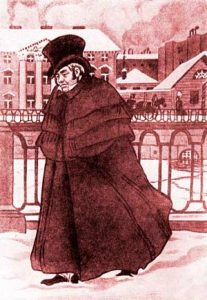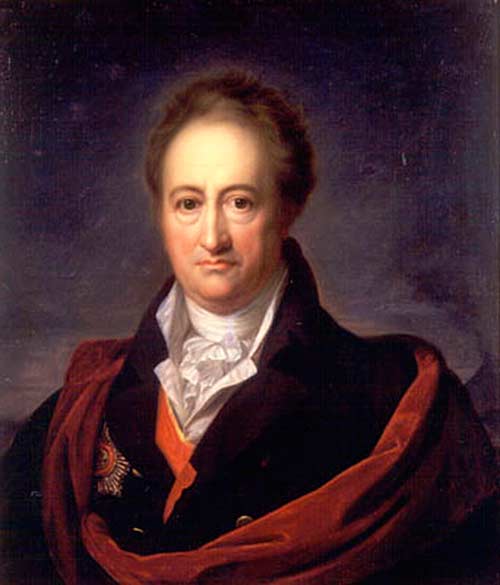Akaky Akakievich Bashmachkin in the story “The Overcoat”
 The Gogol story “The Overcoat” (see its full text, summary and analysis) depicts a petty, downtrodden and pathetic official Akaky Akakiyevich Bashmachkin (see his description in the text of the work). He is so humiliated, so intimidated, so offended by fate that, apart from the mechanical rewriting of papers, he does not know how to do anything. He says more pronouns and interjections, is afraid of mocking co-workers and trembles in front of the authorities.
The Gogol story “The Overcoat” (see its full text, summary and analysis) depicts a petty, downtrodden and pathetic official Akaky Akakiyevich Bashmachkin (see his description in the text of the work). He is so humiliated, so intimidated, so offended by fate that, apart from the mechanical rewriting of papers, he does not know how to do anything. He says more pronouns and interjections, is afraid of mocking co-workers and trembles in front of the authorities.
He is so humble and unresponsive, that it never occurs to him to complain about his dismal life or to grumble about fate. Only occasionally, when young officials too mock him and prevent him from working, he quietly says: “Leave me! Why are you insulting me? ”
“And something strange was in the words and voice with which they were spoken. Something was heard in him, pitying that one young man who, following the example of others, allowed himself to laugh at him, suddenly stopped, as if pierced, and since then everything seemed to have changed before him and seemed in a different way. . Some unnatural force pushed him away from the comrades with whom he met, taking them for decent secular people. And for a long time, among the funniest moments, a low official with a bald spot on his forehead, with his penetrating words, “seemed to him, leave me! Why are you insulting me?” And in these penetrating words other words rang: “I am your brother!”
These amazing words change our whole attitude to Akaky Akakiyevich. In this ridiculous creature, in this paper machine, we suddenly see a mournful human face – and our laughter gives way to an agonizing pity. The founder of the “natural school” Gogol opened a new field for Russian literature: the world of “little people”, imperceptible sufferers, humble and meek victims of social injustice, the world of the poor, needy, poor in spirit, “humiliated and offended”.
And after the romantic heroes, proud personalities, despising the crowd, rebelling against society, mysterious, disappointed and intoxicated by their own greatness, the “little people” seemed alive and close. Gogol’s words rang out: “I am your brother!” – and all subsequent writers, and Turgenev, and Dostoevsky, and Nekrasov, and Tolstoy, responded warmly to them. Russian literature imbued with compassion for a humiliated and unhappy person, a love for his suffering soul, a humane attitude towards his smaller brothers. All she began to fight for the dignity of man and for the improvement of his bitter fate in our land. The humanism and philanthropism of Russian literature comes from Gogol, and this is his great merit.
Akaky Akakievich is convinced that his old overcoat is no good, and starts saving money to buy a new one. He denies himself food, walks on tiptoes, being afraid to wear his boots, sits in his underwear at home to save the dress. He lives as an ascetic and ascetic, and only the dream of a new overcoat supports him among the hardships.
Finally acquired overcoat. Comrades invite him to visit to celebrate this joyful event. But on the way back home, thieves take off their overcoat from Bashmachkin. He runs through the offices, complaining about the theft, his superiors “chastise” and stamp their feet. Akaky Akakiyevich falls ill with grief and soon dies.
So uncomplicated and sad story of a poor official. In what spiritual solitude, in what desolation this man lived, if his greatest ideal, a warm wadded overcoat could become a most beautiful dream! But in spite of all his undeveloped and forgotten nature, he was capable of both willpower and heroic self-denial in the name of his dream. Is it his fault if the powers given to him by God were spent in vain, if his purpose was so low?
Are not we all guilty passing indifferently by our brothers, immersed in cold and selfishness?


